E-Boat War Badge, Type I, by Steinhauer & Lück
CATEGORY: Version
SKU: 01.GTR.0904.101.04.000
Estimated market value:
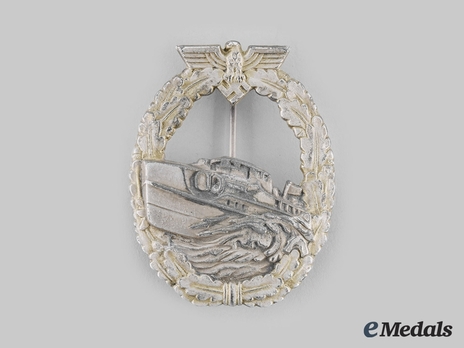
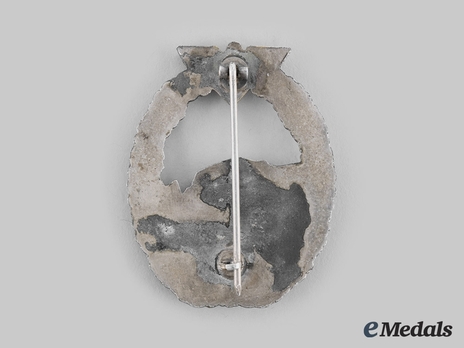
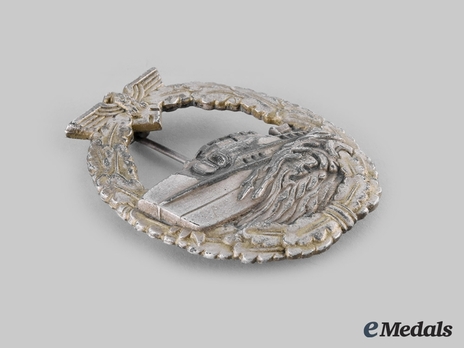
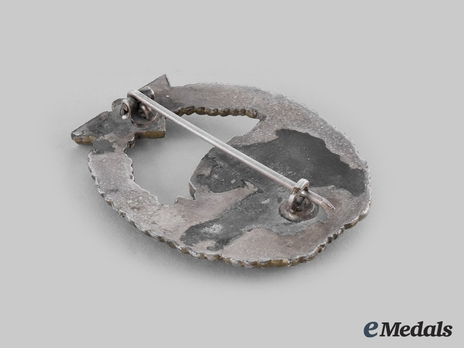
Estimated market value:
Constructed of gilded and silvered zink, the obverse consisting of an oval oak leaf wreath, joined together at the bottom by ribbon, topped by a Kriegsmarine-style German national eagle clutching a mobile swastika, with a central depiction of an E-Boat cutting through waves, the reverse with a crimped barrel hinge and vertical pinback meeting a flat wire catch, unmarked but with the physical characteristics of manufacture by Steinhauer & Lück, Lüdenscheid, measuring 45.02 mm (w) x 57.44 mm (h), weighing 31.7 grams, loss of gilt and silver finish evident throughout, in overall very fine condition and very scarce badge by this maker.
The E-Boat War Badge was established on May 30, 1941, a year in which the E-Boat offensive was becoming increasingly important. Before this point, E-Boat crews received the same decoration as Destroyer crews. The badge was conferred upon crews who participated in 12 operational missions, although this stipulation was waived if a mission had been particularly successful, or if members of the crew were wounded. This requirement could also be overlooked if a crew’s ship was sunk by enemy forces. The badge was also awarded posthumously when the recipient was killed during active service.
There are two main versions of this medal. The Type I badge features a silver-coloured E-boat cutting through the waves. The boat is surrounded by a gilded wreath, and the bow of the boat rests on the centre of the wreath. The wreath is composed of large, finely gilded oak leaves and acorns. At the bottom of the wreath, there is a bow that is composed out of oak leaves that are connected by a central band. The top of the wreath features the national emblem, an eagle with short wings and a small body. The eagle is clutching a swastika in its talons.
The Type II badge was introduced on January 28, 1943 after complaints of E-boat crew members about the Type I badge. Apparently, the Type I badge featured an unsatisfactory boat design not in keeping with the actual E-boat look. The Type II badge features a larger, more modern E-boat cutting through the waves. The bow of the boat and the parting waves extend past the wreath. The wreath is flatter than Type I and is composed of smaller oak leaves. The national emblem at the top of the wreath is larger, the eagle has longer wings, and the swastika clasped in its talons is larger and may hang lower. The bow at the bottom of the wreath is composed of four oak leaves that are connected together with a band. Earlier awarded Type I badges were not exchanged.
Both the Type I and Type II badge were designed by Wilhelm Ernst Peekhaus from Berlin, the second one with the help of Korvettenkapitän and Knight’s Cross recipient Rudolf Petersen. There is a unique version of the badge that was manufactured by a French maker Mourgeon in Paris. This version features a hollow reverse, a French-style hinge and pin, and is silver in colour.
E-boat badges can feature the regular vertical hardware setup, as well as hardware arranged horizontally. Due to their late introduction, Type II badges are all made of zinc.
Badges by Steinhauer & Lück are unmarked. They are attributed to the company due to the hardware used. Badges are made of zinc.
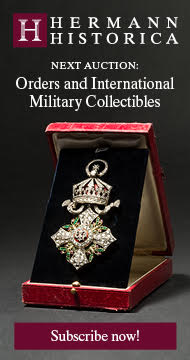
Comments
Sign in to comment and reply.

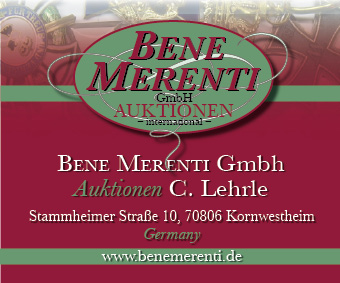
Scroll Top